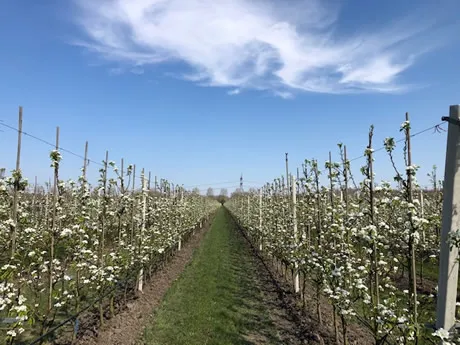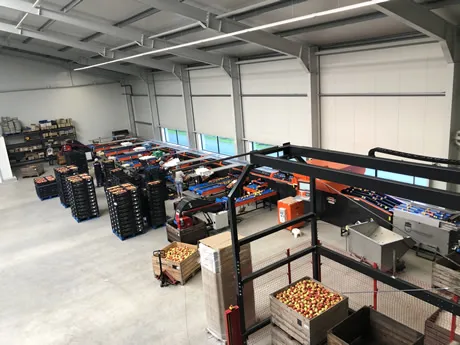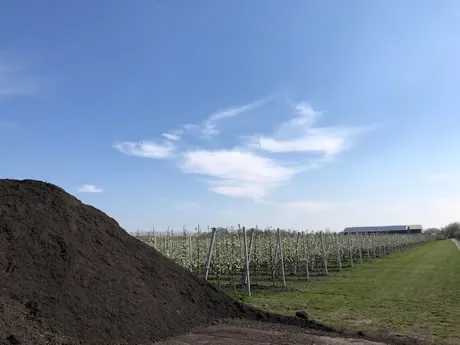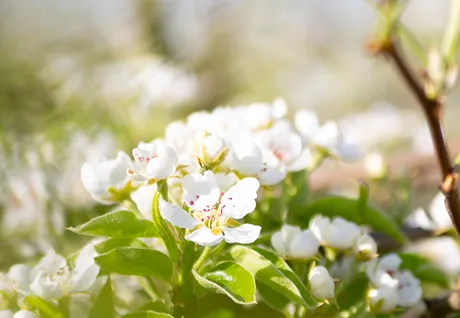The volume of Dutch organic fruit is just about sold out. For Elshof Organic Fruit from Dronten, in the Netherlands, this is reason enough to focus on the Conference so-called 'switch' pears. "We sell these to health food store throughout Europe. However, the market is limited," says Robert Elshof.
"Supermarkets do not want 'switch' fruit. They only want conventional or organic. There is a lot of this 'switch' fruit available. But, at the same time, there are boatloads of organic pears coming in from Argentina. So, there is somewhat pressure on the market. In our view, that is a shame. That is why we are trying to convince our clients to choose Dutch 'switch' pears over the organic import pears from Argentina."

Elshof Organic Fruit still has more than enough organic apples. They grow these in their own orchards. "I expect we will still be able to deliver these until June/July. We supply these organic apples mostly to Dutch and Belgian supermarkets. It is also our goal to sell as much fruit as possible locally. With pears, we are not succeeding in this. This is because the market is far more Europe orientated," explains Robert.
"Our sales countries are Germany, France, and Scandinavia. They grow very few good-quality pears there." Robert is satisfied with this year's organic top fruit sales. "Organic apples and pears sold well. However, we had a few batches with quality issues. This was also the case with the conventional market. After the hot summer, many growers were worried about their products' shelf life. This put pressure on the market."

In any event, Elshof was able to sort a considerable amount of organic fruit this year. This is thanks to their new building, which trebled their capacity. "And we use this space. Several large, modern farmers have told us they want to switch to organic products. We are guiding them through the whole process," Robert goes on to say.
"We have taken a new optical sorting plant into use. This Perfect machine from machine manufacturer, Wamel, is used for quality grading. Forty images are taken of each piece of fruit. We are the first player in the organic sector using this technique. Our experiences of it are good."
"We have also installed a new Burg Machines supply line. It has water drains. Besides this new line, we have also renovated our existing line. This makes us much more flexible," adds Robert.

According to Robert, the new building is perfect. "The warehouse is very spacious and has LED lighting. The cooling unit feeds residual heat to the underfloor heating. All in all, it is a nice environment to work in. We have had a new pear cooling space constructed too. Roma and Dijksma Refrigeration Engineering built it."
"The space was specially designed for the organic market. This is because organic pears need to be refrigerated differently from conventional pears. When it comes to cooling conventional pears, everything is aimed at minimizing dehydration. This is done by means of wet-cooling. However, wet and organic do not go well together," Robert says.

Last but not least, Elshof Organic Fruit has installed 1,100 solar panels. Annually, these should produce 400,000-kilowatt hours of electricity. "All in all, we are working 100% energy-neutrally. For us, this is even more reason to show our local buyers the benefit of working with local fruit. In the past, there were all kinds of investigations. These showed that there should be a lower CO2 tax on import fruit that Dutch fruit that has been refrigerated for months. However, when it comes to generating electricity, this no longer applies," continues Robert.
 Another new development is that Robert and his peers from the organic sector have founded a knowledge platform. It is called Biogrownection. "We have bi-monthly meetings. Here we, transparently, share knowledge in the areas of cultivation and the market. This means we, as growers, can respond accordingly," he says.
Another new development is that Robert and his peers from the organic sector have founded a knowledge platform. It is called Biogrownection. "We have bi-monthly meetings. Here we, transparently, share knowledge in the areas of cultivation and the market. This means we, as growers, can respond accordingly," he says.
"There has been an ongoing discussion about the power inequality in the chain for many years now. We are, however, trying to turn this around. We are trying to establish partnerships, from the cultivation sector, directly with buyers. According to us, this makes for a win-win-win situation. By working with large parties, supermarkets have a constant supply available with little wastage."
"The growers get a good price for their product. This means they can grow their business now and in the future. They can then invest in making their farms sustainable. And the consumer gets an organic product with a good backstory. What more could you want?" concludes Robert.
For more information:
Robert Elshof
Elshof Organic Fruit
8251 RX Dronten, NL
Tel: +31 (0) 321 312 719
info@elshoffruit.nl
www.elshoforganicfruit.com
